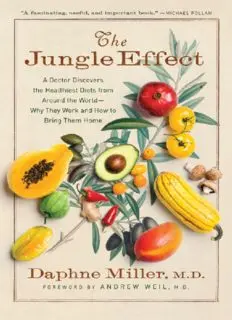
The Jungle Effect: A Doctor Discovers the Healthiest Diets from Around the World--Why They Work and How to Bring Them Home PDF
Preview The Jungle Effect: A Doctor Discovers the Healthiest Diets from Around the World--Why They Work and How to Bring Them Home
The Jungle Effect A Doctor Discovers the Healthiest Diets from Around the World— Why They Work and How to Bring Them Home Daphne Miller, MD WITH NUTRITION CONSULTATION FROM Allison Sarubin Fragakis, MS, RD To my ancestors—and yours as well. Their wisdom might just end up being our saving grace. Contents Foreword by Andrew Weil, MD vi One Introduction: The Jungle Effect 3 1: Dining in the Cold Spots 9 2: Anatomy of an Indigenous Diet 23 3: A Diet Lost in Translation 39 4: Feeding Our Genes or Our Taste Buds? 47 Two 5: Copper Canyon, Mexico: A Cold Spot for Diabetes 59 6: Crete, Greece: A Cold Spot for Heart Disease 89 7: Iceland: A Cold Spot for Depression 127 8: Cameroon, West Africa: A Cold Spot for Bowel Trouble 161 9: Okinawa, Japan: A Cold Spot for Breast and Prostate Cancers 193 10: Foraging for Indigenous Foods in a Modern World 231 Three Cold Spot Recipes 249 Appendices A. Cold Spot Shopping Lists 301 B. How to Cook Indigenous Grains and Beans 307 C. More About Fats and Cooking Oils 313 D. Getting Your Omega-3 Fats 319 E. Organic? A Priority List 321 F. Useful Cooking Equipment for Preparing Indigenous Foods 325 G. Recommended Indigenous Cookbooks 327 Notes 331 Acknowledgments 367 About the Author Credits Cover Copyright About the Publisher v Contents Foreword BY ANDREW WEIL, MD With so much confusion and contradictory information about diet and health, where can we turn for guidance? One possibility is to look to the time-tested wisdom of traditional peoples whose freedom from many of the diseases that plague us seems to have a lot to do with their eating habits. That is just what the author of this book, Daphne Miller, MD, has done. She has identified “cold spots”—areas of strikingly low incidence of cardio- vascular disease, colon cancer, depression, and other common Western ailments—has visited them, and has studied eating patterns that likely ex- plain the good health of their populations. Some of Dr. Miller’s research will really surprise you. Who would have thought that Iceland was one of the world’s cold spots for depression? Ice- land is certainly cold, but it’s also very dark and gloomy for much of the year. Yet the prevalence of depression of all types, including seasonal affec- tive disorder, is so low that it demands explanation. Icelanders, it turns out, consume more omega-3 fatty acids than any other people, not only from fish but also from roasted seabirds that eat fish, and from the meat and milk of animals that graze on omega-3-rich mosses and lichens. Scientific evi- dence for the mood-stabilizing and antidepressant effects of these essential fats is solid and growing. vi When one observes an unusually high or low incidence of a disease in a population, it is reasonable to ask whether it is due more to genetics or to lifestyle. In this particular case, we have a good idea, because a lot of the Icelanders who emigrated to eastern Canada in the late 1800s were unable to maintain their high omega-3 intake, and became much more susceptible to depression. Because traditional diets are disappearing rapidly as Western processed food and fast food spreads around the world (with chronic dis- eases close behind), it is possible to draw similar conclusions about the rela- tive importance of lifestyle versus genes in the other disease cold spots described in these pages. In short: lifestyle in general and diet in particular are very important. Daphne Miller is a physician who studied integrative medicine with me at the University of Arizona. Like me she has a keen interest in nutrition and health and in the practice of lifestyle medicine. She wants to distill the dietary wisdom of traditional peoples and adapt it to our modern world. What is remarkable in her investigations is the uniformity of general prin- ciples of the native diets she has studied. Whether in Iceland, Okinawa, West Africa, or the remote canyon country of northwest Mexico, the rules are clear: avoid refined, processed, and manufactured foods; eat good fats and avoid bad fats; eat slow-digesting as opposed to quick-digesting carbo- hydrates; eat plenty of fresh fruits and vegetables; enjoy a variety of health- protective spices, condiments, and beverages; and get lots of regular physical activity. This is native dietary wisdom in a nutshell, and we can easily adapt it to our own tables. Dr. Miller helps us incorporate this wisdom by providing recipes from native cultures reworked for ease of preparation in a typical North Ameri- can kitchen. I can’t wait to try the West African ndole stew she loves and to make my own version of goya champuru, a stir-fry dish containing tofu and bitter melon that I enjoyed in market restaurants in Okinawa while study- ing healthy aging there. And I will certainly refer patients to Dr. Miller. Her accounts of dramatic clinical success from teaching patients to prepare and eat native foods are inspiring. This is a groundbreaking book, based on original research, that describes novel dietary strategies for reversing the progression of chronic diseases and maintaining optimum health. Moreover, the native dietary wisdom that vii Foreword Daphne Miller presents is fully consistent with the findings of cutting-edge nutritional science. I think you will learn as much from it as I did and be inspired to put that knowledge to use. Tucson, Arizona October 2007 Foreword viii
